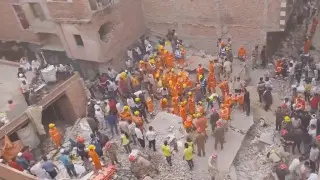
ANI
The Uttar Pradesh government recently invoked the Essential Services Maintenance Act (ESMA) on February 16, 2024, imposing a six-month ban on strikes by government employees across all departments, corporations, and authorities. This decision comes amidst ongoing protests and strikes by various groups, including farmers.
A notification banning the strike has been issued during ongoing farmers strike called by various union organizations. Last year also, the UP government had banned the strike by implementing the ESMA Act, then some employees of the electricity department went on strike. ESMA was passed in the Parliament in 1968. Using this, any state government can ban strikes in its area. It can be applied for up to 6 months at a time.
“In exercise of the powers under sub section (1) of the section-3 of the Uttar Pradesh Essential Services Maintenance Act, 1966 (UP Act No 30 of 1966), the State government prohibited strike for a period of six months from the date of the notification,” the notification issued by Additional chief secretary (ACS) Devesh Chaturvedi read.
The Act grants police the authority to detain employees who violate its terms without a warrant. Anyone found to have provoked a strike that was prohibited by the Act faces up to a year in prison, a fine of up to Rs 1,000, or both.
Scope of the ban: It applies to a wide range of essential services, including transport, banking, communication, and healthcare. However, it's important to note that ESMA can be invoked for other sectors as well, depending on the situation.
Duration: The ban is in effect for six months from the date of invocation.
Possible reasons: The government hasn't explicitly stated the reasons for invoking ESMA, but it could be related to ongoing protests and strikes causing disruptions to essential services.
Article 19 (1A) of the Indian Constitution guarantees the right to freedom of speech and expression. However, this right is not absolute and can be restricted in certain circumstances. For example, Article 19 (2) allows the government to impose reasonable restrictions on freedom of speech and expression in the interests of public order, security, morality, and other legitimate government interests.
In recent years, there has been an increase in concerns about the limitations to freedom of speech in India. These concerns have been fueled by a number of factors, including the arrest of journalists and activists on charges of sedition, the use of online surveillance to monitor dissent, and the passage of laws that restrict access to information.













Copyright © 2025 Top Indian News
